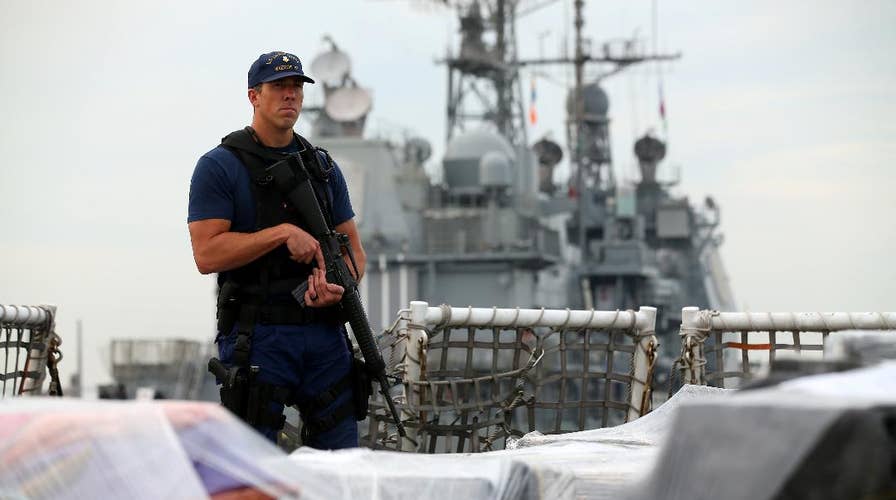US Coast Guard faces budget cuts
Steve Harrigan of Fox News on the potential Coast Guard budget cuts, and newest technology protecting the U.S. coast.
FORT LAUDERDALE – The US Coast Guard can barely offload the cocaine it intercepts at sea before drug runners load up their go-fast boats and head toward U.S. shores.
This Tuesday, the crew of the Coast Guard’s newest Cutter, James, offloaded a record 16 tons of narcotic in Fort Lauderdale’s Port Everglades. Just two days later, the agency announced another cocaine bust, this time almost two tons near Puerto Rico.
“We’re averaging about 12 of these per month,” said Coast Guard Capt. Kevin Gavin. “As I like to say, unfortunately business is very good for us and I wish it wasn’t.”
COAST GUARD SEIZES 16 TONS OF COCAINE WORTH OVER $400M IN PACIFIC
Gavin is the commanding officer of the Coast Guard’s HITRON unit, which stands for helicopter interdiction tactical squadron. The unit’s sole responsibility is manning armed Coast Guard helicopters to intercept dangerous drug traffickers.
It’s high-risk work that usually takes place on water in the pitch dark, when smugglers normally operate.
HITRON squadrons work in conjunction with Coast Guard teams like the one on Cutter James — which is equipped with technology that expertly detects smuggling boats on low or no-visibility nights.
On its maiden voyage, James’ crew of 126 captured 17 separate smuggling vessels— most them transporting cocaine in bulk— all in just 26 days at sea.
TRUMP BUDGET SEEKS DEFENSE SPENDING BOOST, MAJOR CUTS IN OTHER AGENCIES
The helicopter pilots and precision marksmen are among some of the most skilled in service. They say they often have to choose what to believe – their eyes, which can play tricks on them at night, or their instruments, which are tuned with pin-point precision.
“Disabling [gun]fire can be very dangerous. We’re shooting live ammunition in close proximity to people, hoping to avoid any injuries,” said the HITRON pilot who took part in James’ bumper haul. His name cannot be used.
In one night alone, the James interdicted and disabled three drug vessels using the HITRON helicopter squadron along with teams deployed in all three of their small boats.
“The last thing [on the mission] was land on the ship, shut down the aircraft. And once that happened, we kind of looked around and we said ‘We just did that. We just disabled three boats on a zero-illumination night.’” the HITRON pilot said.
This uptick in drug interdictions by the Coast Guard comes as initial budget proposals for next year threaten sizeable cuts in the agency’s funding. There is pushback on the budget cuts from lawmakers on both sides of the aisle and a call to add additional funding for another new security cutter.
“At any one time, there’s maybe a handful of ships that are out there in the Eastern Pacific,” said Cutter James' Capt. Mark Fedor. “So that’s the equivalent of taking five police cars and trying to maintain law and order throughout the entire United States.”










































